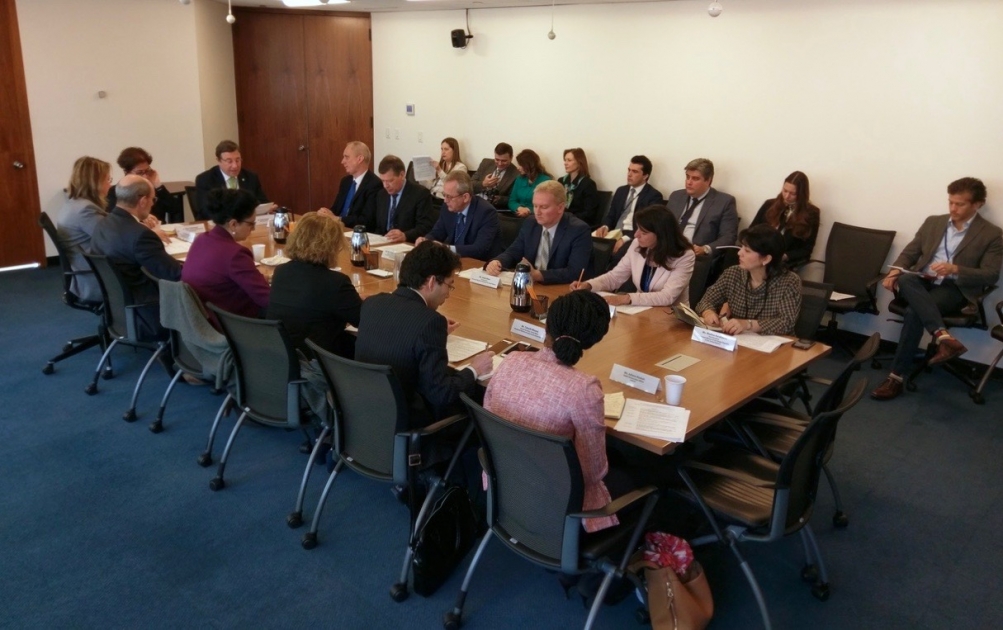Statement by Mr. Sergey Kononuchenko, Deputy Permanent Representative of the Russian Federation to the UN, on IATF on Chernobyl
Your Excellency Vice-Minister, Dear Colleagues,
I would like to express our appreciation to UNDP and personally to you, Mr.Steiner, for continued efforts to support the work of the Inter-Agency Task Force (IATF) on Chernobyl. We all benefited from personal involvement into this work from your predecessor, Ms.Clark.
The Russian side views IATF as a suitable platform to take stock of the recent developments in international cooperation on Chernobyl and to formulate strategic guidance for further activities aimed at the implementation of relevant UNGA resolution (‘‘Persistent legacy of the Chernobyl disaster’’), as well as outcome decisions of the international conferences on Chernobyl.
A word of gratitude also goes to my colleagues from Belarus for their relentless efforts to keep this important ‘dossier’ on the radar of UN activities. We stand ready to further support you in this endeavor.
Russia remains actively engaged in the planning and implementation of international cooperation projects in Chernobyl, aimed on social and economic development and rehabilitation of affected areas. We reiterate our support for the leadership role played by UNDP in this process.
Since our last IATF meeting in April last year, the Russian Federation has carried out a number of activities to address the needs of affected population and territories. These measures are implemented in line with the national targeted federal act №1244-1, adopted in 1991, which has outlined a range of responsibilities of the Russian Government towards affected population and has since then undergone a number of editorials that extend those responsibilities. Namely, in the past 10 years 20 changes were introduced with aim to make the action more needs-oriented, specifically with regards to social and medical support, as well as to the compensations for the damage of property.
In addition to the federal act we have continued to implement a range of special federal programs to support those living on affected territories. Up to date 6 such programs have been carried out, specifically targeting the well-being of children, the provision of housing for Chernobyl’s liquidators and restoration of affected territories. Plus, since 1998 we’ve accomplished 4 joint programs with Belarus, fulfilled under the umbrella of the Union State, and I’ll talk about that more later in my address.
And now I’m pleased to report on the updated figures, which were made possible due to measures, undertaken from 1992 to 2017. Those are as follows:
- Number of contaminated townships has dropped from 7,5 thousand in 1992 to 3,8 thousand in 2016;
- 70.000 people received new accommodation;
- 1 mln. people were provided with gas and heating and 700.000 with water and sanitation;
- new hospitals and schools were deployed on affected territories with a total capacity for 11.000 patients and 4.500 students respectively.
- 3 mln. people were provided with medical check-up; two-thirds of this number received targeted medical assistance;
- one-thirds of arable lands and 14% of forest territories were restored.
Besides that, we significantly progressed in the design and operationalization of radiation safety equipment, as well as items for ground-based and aerial monitoring of radiation. We are open to share this experience and technological advances with our international partners.
In the coming years state-supported measures to address the consequences of Chernobyl fallout will be continued until full rehabilitation of the affected population and territories.
Having outlined what was done in these years in my country, I would also like to expand a bit on our international cooperation. Primary focus of our efforts is now concentrated around the joint project with the Republic of Belarus on the provision of complex medical assistance to the affected population, conducted under the auspices of the Union State since 2016. It is coordinated by the Russian EMERCOM and implemented by three specialized medical centers, namely in Gomel, the Republic of Belarus, Obninsk and Saint-Petersburg in the Russian Federation.
These centers were modernized and well-equipped with the financial support from the Union State, and are currently fulfilling a major part of joint activities to address the consequences of Chernobyl disaster. Both liquidators and affected people are entitled to assistance and support provided by these centers. Since the project was launched in 2016, more than 2,5 thousand people from both countries have received medical support, including almost 700 people, who were treated with high-end technological equipment. In 2018 we are aiming to extend these numbers to another 1,5 thousand people in need.
Our evaluation shows that these activities are in high demand and are socially meaningful, so we are currently working with our Belarus friends on expansion of activities within Unity State project, looking also at such areas the safety of population living in affected areas and restoration of contaminated territories. The new program is being designed within a timeline until 2022.
I would like to conclude with acknowledging the fact that much has been done to overcome the consequences of Chernobyl, but yet much remains to be done. The Russian Federation is determined to further address this issue both in planning of internal policies and development of meaningful cooperation with our neighbors.
I thank you.
